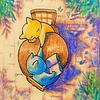Take a photo of a barcode or cover
I think it's part of the human condition to take things for granted. Even while I try to remember the many gifts and opportunities I've had, I tend not to think often of how much my life is better because I can see and hear.
Helen Keller was a remarkable woman, and this account of her life, up through her early 20's is astounding. I would think someone's life who is deafblind might be lacking in a richness or vitality because so many of life's experiences I take for granted are missing. I would also think that if anyone has an excuse to offer excuses, it would be someone like Helen Keller. She proved me wrong...way wrong...on both counts.
Never did I get the sense she felt sorry for herself. To the contrary, she pushed herself to learn and grow, learning to read Latin, French, and German. Many of her insights and descriptions are vivid and compelling. I would be hard pressed to come up with similar expressions of art, poetry, and acting. Think about that for a moment.
If you ever feel like you've been dealt a lousy and unfair hand of cards to play, do yourself a favor and read her autobiography.
Helen Keller was a remarkable woman, and this account of her life, up through her early 20's is astounding. I would think someone's life who is deafblind might be lacking in a richness or vitality because so many of life's experiences I take for granted are missing. I would also think that if anyone has an excuse to offer excuses, it would be someone like Helen Keller. She proved me wrong...way wrong...on both counts.
Never did I get the sense she felt sorry for herself. To the contrary, she pushed herself to learn and grow, learning to read Latin, French, and German. Many of her insights and descriptions are vivid and compelling. I would be hard pressed to come up with similar expressions of art, poetry, and acting. Think about that for a moment.
If you ever feel like you've been dealt a lousy and unfair hand of cards to play, do yourself a favor and read her autobiography.
emotional
funny
hopeful
informative
inspiring
lighthearted
reflective
sad
slow-paced
The 106 pg autobiography is a quick and interesting read. I can't help but admire how much Helen Keller had overcome in her life. Her optimism, ambition, and tremendous love of learning had helped her grow beyond people's expectations. Critics of the book complain about how she didn't talk about what it was like to be blind and deaf, but how would one explain the only situation that they have known to others? (How would we describe seeing or hearing?) She does well in explaining how she has learned to navigate the world through her sense of touch (she writes about vibrations/sensations of being in the city, countryside, feeling people's faces and throat to communicate, etc.). Reading the Letters portion after the autobiography gives you a sense of how she learned to further communicate and understand language. When reading, people should note that she came from a time where assimilating to society was seen as the goal, unlike today where embracing differences is highlighted.
Read as an audiobook.
This was such a neat insight into one of the most famous historical figures, Helen Keller. It was so hard as a kid to imagine how she could live and thrive being blind AND deaf, so her stories and explanations fixed that confusion. She worked quite hard and achieved so much, and this book only covers her life until her college years (she appears to have still been a college student whilst writing this), so I cannot even imagine the successes and experiences she had not yet had at the completion of this book. The book is also filled with history and famous names, some of which have been lost to time, making the book a unique look at an extraordinary person's life as well as at life during the turn of the century (1875s-1900s).
There are some strange parts, of course. For the reader, she tries to include visual and sound imagery that we as readers know she has not experienced herself. Some moments it is clear that the description of the world and sights that she cannot personally experience are skewed to whomever was the one describing it. This story, her life, takes place after the Civil War in the South and during Reconstruction, so some moments are imbued with a picturesque, slightly off-putting version of the South at that time. I do not fault her for having some skewed version of the lives of black people in the South, especially since she lacks an easy way to experience or witness what was more likely going on at the time. So, in addition to idealized social circumstances, she has many an idealized perception of much of the world. She has kind philosophies toward oneness with nature, human goodness and connection, and equality, all well and good for sure.
However, you at times may find yourself wondering what may have occurred had she no support or access to resources. I am happy that she was privileged with such things, especially a dedicated teacher. Her own ability in combination with her support system of people and accessibility allowed her to achieve things that people probably thought would be insurmountable for her. It is certainly a feel-good story in that sense.
I only give it 4☆ because, although the story was interesting and informing, there was not much more. I recommend it to readers who want a unique insight into history and an incredible individual. I also recommend it to people who want to read a good success story because everyone likes to read those now and again.
4☆ Recommended
This was such a neat insight into one of the most famous historical figures, Helen Keller. It was so hard as a kid to imagine how she could live and thrive being blind AND deaf, so her stories and explanations fixed that confusion. She worked quite hard and achieved so much, and this book only covers her life until her college years (she appears to have still been a college student whilst writing this), so I cannot even imagine the successes and experiences she had not yet had at the completion of this book. The book is also filled with history and famous names, some of which have been lost to time, making the book a unique look at an extraordinary person's life as well as at life during the turn of the century (1875s-1900s).
There are some strange parts, of course. For the reader, she tries to include visual and sound imagery that we as readers know she has not experienced herself. Some moments it is clear that the description of the world and sights that she cannot personally experience are skewed to whomever was the one describing it. This story, her life, takes place after the Civil War in the South and during Reconstruction, so some moments are imbued with a picturesque, slightly off-putting version of the South at that time. I do not fault her for having some skewed version of the lives of black people in the South, especially since she lacks an easy way to experience or witness what was more likely going on at the time. So, in addition to idealized social circumstances, she has many an idealized perception of much of the world. She has kind philosophies toward oneness with nature, human goodness and connection, and equality, all well and good for sure.
However, you at times may find yourself wondering what may have occurred had she no support or access to resources. I am happy that she was privileged with such things, especially a dedicated teacher. Her own ability in combination with her support system of people and accessibility allowed her to achieve things that people probably thought would be insurmountable for her. It is certainly a feel-good story in that sense.
I only give it 4☆ because, although the story was interesting and informing, there was not much more. I recommend it to readers who want a unique insight into history and an incredible individual. I also recommend it to people who want to read a good success story because everyone likes to read those now and again.
4☆ Recommended
I first read this book when I was 12, a year ago. It was AMAZING. I do not usually read nonfiction or biographies, but I knew I had to read this one. I first found out about Helen Keller and her story in a short biography I had at home. At the mention of this book in there, I immediately went to the bookstore. This book does not disappoint. I got a Signet Classics edition, with Helen Keller's letters, the manual alphabet, and the Braille alphabet in the last few pages. If you haven't read this, READ IT NOW.
emotional
funny
hopeful
informative
inspiring
reflective
fast-paced
Helen Keller was a great writer.
Dnf at 47%. Not holding my interest, read by narrator in a monotone voice. Not engaging.
Really, really good! Lots of repetition, and it was written when Helen was still in college, but I enjoyed it non-the-less. Anne Sullivan's letters were very humorous as well. :)
There would be few people who were unaware of Helen Keller and her remarkable teacher, Anne Sullivan. This book fills in quite a lot more detail, however, eg I hadn't realised that she was the first deaf-blind person to gain a degree. Living in a world of darkness until she was six, she beautifully describes how Anne Sullivan gradually introduced her to the world of language and books, often using the natural environment as her inspiration, and always allowing her methods to be guided by the child's curiosity. At the same time, we see Helen's increasing joy in life as her incredible mind is allowed to develop. This is further highlighted in the middle section of the book which is a collection of her letters to her mentors and supporters, including such luminaries as John Greenleaf Whittier, Oliver Wendall Holmes, Mark Twain and Mrs Grover Cleveland. Her determination to complete her tertiary education against considerable odds is inspiring, as is the final section of the book in which Anne Sullivan describes her methods. As a former educator, I found this book enlightening. As a reader, I found it luminous, infused with hope and joy.
informative
reflective
slow-paced





